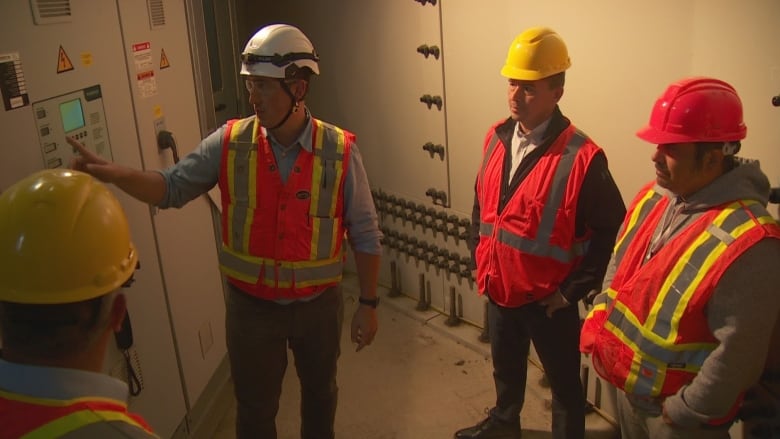Neqotkuk First Nation, formerly known as Tobique First Nation, has started making money from its wind farm near Sussex.

Neqotkuk First Nation, formerly known as Tobique First Nation, in western New Brunswick has started making money from its wind farm in the southern part of the province.
The first payment came to about $430,000 and Chief Ross Perley expects returns will only get better.
“We had some mishaps with one of the turbines, which was down for a number of months, and we had some expenses,” he said. “But put it this way: The community should see on an annual basis around $800,000 to $1.2 million going forward.”
Perley says he’s going to invest the money in much-needed infrastructure, including new housing and road repairs. He’s also contemplating a wind power bonus cheque that would go out to families, possibly just before Christmas. “So they can do something for their kids,” he said.

The Wocawson Energy Project, near Sussex, is named for a Wabanaki legend, a giant mountaintop spirit bird whose wings make the wind.
The namesake mechanical turbines also inspire some awe.
Each tower rises 131 metres, about the height of the Great Pyramid of Giza in Egypt, and each blade is equivalent in length to the wing of a Boeing 747.
The blades make a swishing sound that some compare to a computer server room. Others say it’s more like the sound of sea waves, tumbling over a pebbly beach.
They’ve been turning since December 2020, about 21 months after the project broke ground.
New infrastructure being built
Perley says he’s always been in favour of clean energy and reducing greenhouse gases but his main motivation is to make Neqotkuk self-sufficient.
“I would say in the last five years, we’ve built the foundation for future success,” said Perley, whose community recently added amenities such as a beach pavilion on the Tobique River, a youth centre and a ball field.
WATCH | How a wind farm is creating a windfall for a N.B. First Nation:

How a wind farm near Sussex is creating a windfall for a First Nation in New Brunswick
The Wocawson Energy project makes enough energy to power 5,000 homes but gives Neqotkuk First Nation, formerly known as Tobique, so much more in return. 6:34
Construction is also underway on new infrastructure to protect the community’s drinking water, as well as a new waste diversion centre.
“When I ran for chief, things were bleak,” said Perley.” We had financial troubles. We were in third-party management. Nobody wanted to do business with us.”
Renewable energy company an eager partner
Natural Forces was an exception. The renewable energy company, based out of Halifax, has grown its business by partnering with Indigenous communities on solar and wind projects.
Executives were talking with Neqotkuk band council as early as 2014.
Together, they got their pitch accepted by NB Power under the government’s Locally-Owned Renewable Energy Small Scale (LORESS) program. They also cleared the environmental studies, and in 2018, signed a 30-year power purchase agreement with NB Power “for a good price,” said Perley.

Enercon, the German company that manufactures the turbines, also signed a long-term maintenance contract that will cover the entire life cycle of the project, said Robert Apold, executive director of Natural Forces.
“So we feel very protected with that,” said Apold. “Communities can’t come up with millions of dollars if something goes wrong so we make sure the risk is taken off the table.”
The First Nation owns 51 per cent of the wind farm. Natural Forces owns 49 per cent.
Housing a top priority
In 2007, Negotkuk was millions of dollars in debt and Ottawa imposed third-party management, which means the band had to pay an outside agency to manage its financial affairs.
It’s a controversial intervention and leaders say the community languished for 12 years.
Most critically, there were no new housing builds.
Today, some 200 families are still waiting to get into suitable housing, says Ken Moulton, Neqotkuk’s public works director.

He says some families are doubling up in existing housing stock. Overcrowding is an issue.
“I’m sure it contributes to a lot of other problems that we have in the community,” said Moulton. “Because if you don’t have a good place to lay your head or do your schoolwork or invite your friends to, it’s a huge problem.”
Tanna Pirie says the wind farm has helped restore hope and pride in the community.
As former CEO, she was part of the early negotiations. She also travelled to the Netherlands and Germany to see how wind energy has changed over the centuries, from old-fashioned Dutch windmills to modern turbines.
“It helps you understand the longevity of that technology and how far it has come,” she said.

Because the site near Sussex was chosen for its wind patterns and proximity to power generation lines, people in Neqotkuk, who live nearly three hours away, don’t see it every day. But Pirie says they know it’s there.
“I had a family member drive by on her way to Moncton and she said, ‘You know, tears came to my eyes because I know they’re ours.'”

